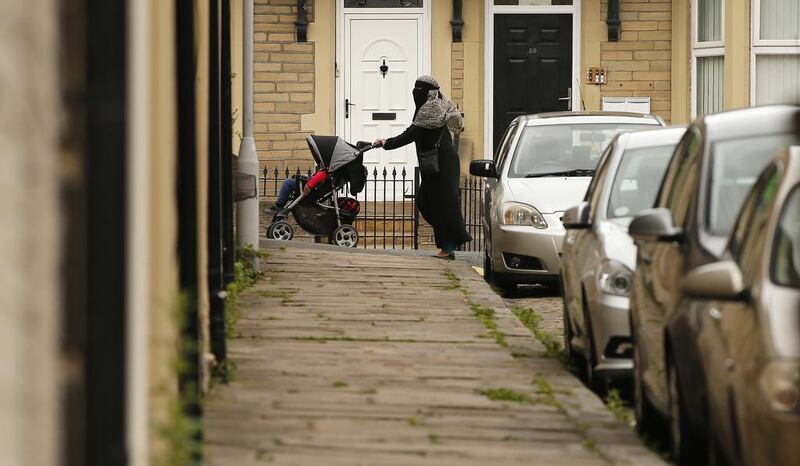London // The UK government should consider requiring new immigrants to swear an oath of integration with the country’s values as a condition of entry and citizenship, recommended a major report on the place of Muslim and other minority communities in British society.
In a damning survey of the state of community relations, the government-commissioned Casey Review highlighted a growth in “regressive” ideologies as well as disturbing levels of segregation, deprivation and social exclusion.
Led by Louise Casey, a former official of the Shelter charity for the homeless with wide experience of leading government projects on troubled families and victims of crime, the report castigated ministers for failing to ensure social integration keeps up with an “unprecedented pace and scale of immigration”.
It contrasted the lack of progress with the declared ambition of Theresa May, then interior minister and now prime minister, to do more than any previous government to promote integration.
Sajid Javid, Britain’s communities minister and himself the son of an immigrant Pakistani bus driver, said the report was a valuable contribution to ensuring the UK, “long home to lots of different cultures and communities”, was also a single society.
He added: “I will be studying her findings closely and reporting back in the New Year.“
But reaction from Muslims was mixed. Miqdaad Versi, assistant general secretary of the British Muslim Council, tweeted that it was a “worrying state of affairs” that the report’s most enthusiastic supporter was Nigel Farage, former leader of the populist anti-immigration UK Independence Party.
Sadiq Khan, the Muslim mayor of London, welcomed “an important report” and said: “Improving social integration and building cohesive communities is a priority for me.”
Among other key recommendations, the report urged greater emphasis on mixing children of different backgrounds, notably in school sporting activities.
It also suggested an oath obliging those taking public office to “uphold the fundamental British values of democracy, the rule of law, individual liberty and mutual respect for and tolerance of those with different faiths and beliefs and for those without faith”. It called for regular monitoring of race crime and special classes to tackle “cultural barriers” to employment prospects.
The report said: “The promotion of British laws, history and values within the core curriculum in all schools would help build integration, tolerance, citizenship and resilience in our children.
“More weight should be attached to a British values focus and syllabus in developing teaching skills and assessing schools’ performance.”
Too many public institutions — national and local, state and non-state — have tried to accommodate diversity and freedom of expression to the extent or ignoring or even condoning “regressive, divisive and harmful cultural and religious practices, for fear of being branded racist or Islamophobic”, according to the report.
It said this ranges from relatively trivial issues, such as altering traditional cultural terms to avoid giving offence, to the department responsible for integration policy spending more in two successive years on promoting the Cornish language in one county of south-west England than on the English language.
On the proposed new criteria for immigrants, the report said: “The government should look at what is required for British citizenship, as opposed to leave to remain, and separately consider an oath of integration with British values and society on arrival, rather than awaiting a final citizenship test.”
The year-long study was commissioned during the tenure of former prime minister David Cameron as part of the government’s strategy for tackling extremism.
Ms Casey warned of a growing sense of grievance in parts of the Muslim community and pointed out the plight of women marginalised by their own poor grasp of English while being subjected to “coercive control, violence and criminal acts of abuse, often enacted in the name of cultural or religious values”.
She was scathing in her description of the government’s provision of a “relatively small pot of funding going toward small-scale exemplar projects such as interfaith dialogue, training curry chefs or cross community social events”.
“This has been described to us as amounting to ‘saris, samosas and steel drums’ for the already well-intentioned,” she said.
Worthy and enjoyable as such projects are, she said, they are not enough on their own and should not be a substitute for tackling difficult issues.
The review did not limit itself to Muslims. It identified examples of inequality and intolerance in other ethnic and faith groups, including “increased Sikh extremism”, for example in the disruption of mixed faith weddings, and the treatment of women in some strictly Jewish Orthodox communities where children are reportedly taught that a woman’s role is to look after children, clean the house and cook.
“All such instances undermine integration and should be challenged,” the report said.
Ms Casey told the BBC as the report was published on Monday that while some parts would be “hard to read, particularly for Muslim communities”, Britain had to face up to uncomfortable problems with “misogyny and patriarchy” widening inequality in some communities.
foreign.desk@thenational.ae






